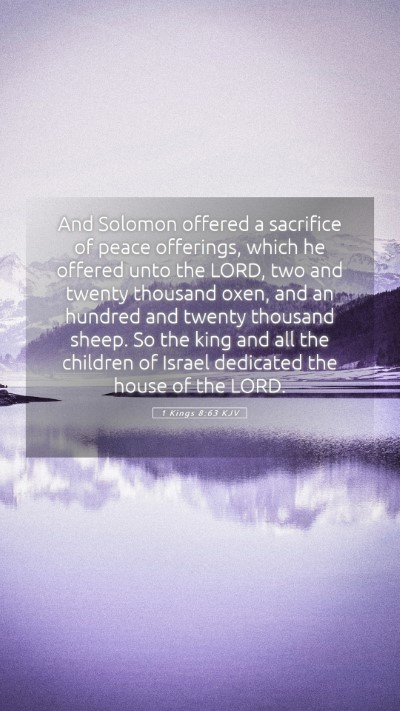Understanding 1 Kings 8:63
1 Kings 8:63 states, "And Solomon offered a sacrifice of peace offerings, which he offered unto the LORD, two and twenty thousand oxen, and a hundred and twenty thousand sheep: so the king and all the children of Israel dedicated the house of the LORD."
This verse captures a monumental event where King Solomon dedicates the Temple in Jerusalem, emphasizing its significance in Jewish worship and the covenant relationship between God and His people. Below, we provide a detailed analysis using insights from various public domain commentaries to enhance understanding and provide context.
Insights from Commentaries
Matthew Henry's Commentary
Matthew Henry highlights the overwhelming generosity in the sacrifices made by Solomon. He emphasizes that an offering of such magnitude reveals the gravity of the occasion, setting a precedent for worship. The peace offerings also symbolize harmony and reconciliation between God and His people. According to Henry, this illustrates the fidelity of the Israelites to their covenant with the Lord.
Albert Barnes' Notes
Albert Barnes discusses the number of sacrifices in this verse, noting that the vast quantity of offerings provides a clear signal of the people's devotion and the importance of the event. He points out that the peace offerings specifically were meant to celebrate the completion of the temple and to seek God’s continued favor. Barnes also elaborates that this act of worship was communal, bringing all the children of Israel together in a unified act of dedication to the Lord.
Adam Clarke's Commentary
Adam Clarke offers a detailed exploration of the aspects of the peace offerings, which were often joyfully shared among the congregation after being presented to God. This indicates that worship was not only a personal affair but involved social elements as well, reflecting community involvement in the relationship with God. Clarke also suggests that Solomon's immense sacrifices highlight not only personal piety but national significance, marking the Temple as the central place of worship for Israel.
Key Themes in 1 Kings 8:63
- Dedication of the Temple: The act of dedicating the temple signified the establishment of God's house among the Israelites, a focal point for worship and sacrifice.
- Vows and Offerings: The massive scale of offerings symbolizes not only gratitude but also a commitment to the covenant. This ties back to biblical principles of stewardship and sacrifice.
- Unity in Worship: The gathering of the people illustrates the communal aspect of worship in Israel, with the temple serving as a unifying center.
- Peace Offerings: These offerings were a way for the people to express their joy and gratitude to God, further emphasizing the relational aspect of worship.
Related Cross References
- Leviticus 7:11-15 - Discusses the laws concerning peace offerings.
- 1 Chronicles 29:21 - Details the offerings made during the dedication of the temple.
- Exodus 20:24 - God’s command for making altars and offering sacrifices.
Applications and Significance
The application of 1 Kings 8:63 today remains vital for understanding worship practices and community character in faith. It encourages believers to:
- Understand the importance of dedicating spaces (homes, communities) for worship.
- Engage in community acts of worship, reinforcing unity and collective faith experiences.
- Recognize the significance of offerings—not merely as acts of giving, but as expressions of faith, gratitude, and community involvement.
- Reflect on how we dedicate our resources and lives to God in ways that honor and glorify Him.
Conclusion
In summary, 1 Kings 8:63 serves as a critical scripture for understanding biblical worship and the importance of offerings. By exploring this verse through different commentaries, we gain deeper insights into its meanings and applications for today’s believers. This verse and its commentary offer essential tools for Bible study groups, online Bible study courses, and personal discernment, enhancing the understanding of Scripture and biblical exegesis.


